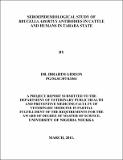UNNSpace Repository
Seroepidemiological study of Brucella Abortus Antibodies in Cattle and Humans in Taraba State
JavaScript is disabled for your browser. Some features of this site may not work without it.
Seroepidemiological study of Brucella Abortus Antibodies in Cattle and Humans in Taraba State
Ibrahim, Gideon
Date:
2015-10-27
Abstract:
seroprevalence study of Brucella abortus antibodies was carried out in cattle and humans in Taraba State. The aim of the study was to determine the current status of B.abortus in cattle and humans and to find the distribution of the infection with respect to settled and nomadic herds, sex ,breed, live and slaughtered cattle, geographical zones and occupation Two LGAs were randomly selected from each of the three senatorial zones totaling six LGAs. In each of the LGAs, 5 herds of cattle were randomly selected totaling 30 herds. In each of the LGAs also, a slaughter house was selected making a total of 6 slaughter houses. Systematic random sampling of 1:4 was adopted to collect 266 blood samples from cattle in the breeding herds and 286 blood samples from slaughtered cattle in the selected slaughter houses/slabs making a total of 552 blood samples. Of the 552 blood samples, 194 were from bulls and 358 were from cows. Out of the 552 cattle, 402 were White fulanis,80 were Red bororo and 70 were Bokologi. Nomadic herds contributed 302 samples while settled herds constituted 250 samples. Blood samples from live cattle were collected from the external jugular vein. In human, blood sample collection was carried out in the same LGAs where cattle were sampled. A total of 230 blood samples were collected from the occupationally exposed persons at abattoirs, cattle farms and meat shops and 183 blood samples were collected from the non-exposed persons with history of recurrent fever at the medical centers of the selected LGAs. Blood samples from the humans were collected by qualified medical personnel after ethical consents of those that participated in the study were obtained. The blood samples were processed and subjected to Rose-Bengal plate test (RBPT) and Serum Agglutination Test (SAT). With the SAT, a titer value of 40 IU/ml and above was regarded as positive. Chi-square statistic was used to determine if there were significant differences in infection rates among the variables considered in the study. Out of the 552 samples from cattle, 49 (8.8%) were positive with RBPT for Brucella abortus antibodies and 45 (8.1%) were positive with SAT. Out of the 45 SAT positives, 26 samples had a titer value of 50 IU/ml , 15 samples had a titer value of 100 IU/ml and 4 samples had a titer value of 200 IU/ml. Of the 266 samples from the breeding herds, 17 (6.0%) were positive with RBPT and 20 (7.5%) were positive with SAT. Out of the 288 samples collected from the abattoirs, 32(11.0%) were positive with RBPT and 25(9.0%) were positive with SAT. Out of the 194 samples from bulls, 14 (7.2%) were positive with RBPT and 16(8.2%) were positive with SAT. In cows, of the 358 samples, 35(22%) were positive with RBPT and 29(18.3%) were positive with SAT. In the settled herds, out of the 250 samples, 19(7.6%) were positive with RBPT and 20(8.0%) were positive with SAT. Of the 302 samples from the nomadic herds, 30(9.9%) were positive with RBPT and 20(8.8%) were positive with SAT. Of the 402 White fulanis, 32(7.9% ) were positive with RBPT and 33(8.2%)were positive with SAT. Out of the 80 Red bororos screened, 8(10%) were positive with RBPT and 7(8.5%) were positive with SAT. Of the 70 Bokoloji screened, 9(12.9%) were positive with RBPT and 5(7.1%) were positive with SAT. In humans, out of the 230 exposed persons, 10(4.3%) were positive with RBPT and 8(3.4%) were positive with SAT. Of the 183 non-exposed persons, 1(1.2%) was positive with RBPT and 3(1.6%) were positive with SAT. Chi-square analysis revealed significantly (p<0.05) higher rate of infection in the nomadic herds compared with those in the settled herds. There were no significant (p>0.05) differences in the infection rates among sexes, between breeding herds and slaughtered cattle, among the three Senatorial zones and the breeds of cattle in the state. In humans, there was a significantly (P<0.05) higher prevalence rate among the exposed persons than the non-exposed individuals.
Files in this item
This item appears in the following Collection(s)
Search UNNSpace
Browse
-
All of UNNSpace
-
This Collection
